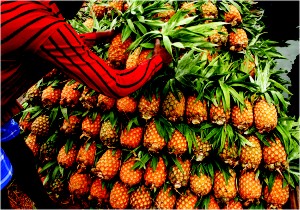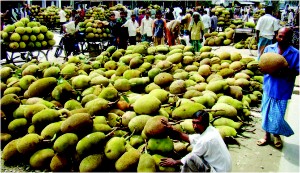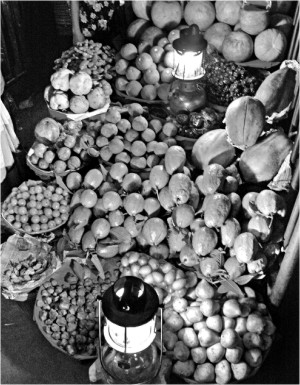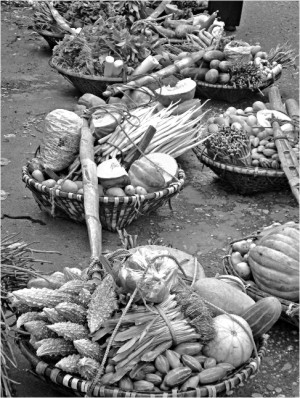
Safe fruits and vegetables
Dr Kshirode C Roy
 |
Photo: Amdadul Huq/Driknews |
FRUITS and vegetables are very important in our diet as they contain vitamins, minerals, soluble and insoluble fibers and enzymes, which are essential in combating heart disease, cancer, diabetes and obesity. Unfortunately the per capita consumptions of both fruits and vegetables of Bangladesh are very low. For vegetables, it is only 80 gram (g)/head/day against the standard requirement of 220 g/head/day and for fruits it is only 60 g/head/day against the standard requirement of 85 g/head/day. Their consumptions in developed countries are lot more than the standard requirements. For example, in China those are 118 g/head/day and 559 g/head/day, respectively and in the USA, those are 342 g/head/day and 345 g/head/day. However, in recent years, the production and marketing of both these as well as import of exotic fruits are increasing.
Before the independence, we could see only a limited number of vegetables in small quantities almost throughout the year except winter season. After the independence, the government has given emphasis on agricultural research and extension, which is continuing till today. As a result, during the last forty years, the yield and production of almost all the crops have increased and nutritional condition of people has improved. Now good quantities of vegetables are produced in all the seasons, as scientists have developed good varieties and a few of those can be grown year round. For example, in the past, tomatoes used to grow only during winter months. Now it is available almost throughout the year as heat-tolerant varieties have been developed and extended that can be grown during summer and rainy seasons. This is true for bottle gourd, cabbage, cauliflower and some other vegetables. Also many exotic varieties of fruits and vegetables have been adapted to local condition.
High yielding varieties have some inherent characteristics like consuming more water and fertilizers. Moreover, they are more susceptible to pests and disease attack than local varieties. Farmers of Bangladesh usually apply more chemical pesticides than the standard requirements. Also they knowingly or unknowingly do not follow the safety of their use. Therefore, food becomes unsafe for consumption. As there is no law to govern the pesticide use and cheap chemical pesticides are easily available, farmers apply those more than the requirement. Therefore, most of the high yielding vegetables are unsafe for consumption. For example, in many areas, pesticides are applied in brinjal everyday or alternate day. It is desired that after spraying pesticide, fruits or vegetables should not be harvested within a week or two, depending on their type.
But many farmers harvest those within 6 to 12 hours of spraying, which makes the produce unsafe. Also in Bangladesh, farmers don't wear masks during spraying, therefore, are more prone to health hazards than consumers. A survey on brinjal farmers of Jessore region revealed that 98 per cent of farmers are suffering from different health hazards.
Farmers apply pesticides as particular insects, mites, weeds, nematodes, disease-causing organisms and vertebrates as competitors that may lower the quality and yield of their crops. In fact, the struggle between man and insects began long before the dawn of civilization and will continue in future. Human and certain insect species need the same thing at the same time. Human kind think themselves as the lord and conquerors of nature, but one has to remember that insects had thoroughly mastered the world and taken full possession of it long before men began the attempt.
 |
Photo: Firoz Gazi/Driknews |
In the 1940s, synthetic organic pesticides were introduced first time in the world for crop protection. It was introduced in Bangladesh in 1956. Today's most productive agriculture is the result of high yielding varieties, fertilization, irrigation, farm machinery and pesticide technologies. Otherwise it would not have been possible to feed the growing population from less land than previously had. If proper plant protection measures were not taken, one third to half of the attainable crop production would have been lost.
In the USA, Environmental Protection Agency's current process of evaluating the potential risks of pesticides on food is rigorous and health protective. Both US Department of Agriculture (USDA) and Food and Drug Administration (FDA) conduct sampling and monitoring programs to ensure safe food supply.
Also stringent standards exist to govern the application of pesticides in the field. For example, in California, before farmers can apply most pesticides, they must comply with more than seventy laws and regulations governing their use. This system ensures that pesticides are applied only when necessary and in a safer manner.
In spite of so much laws and regulations and farmers compliance with pesticide application, the US Environment working Group (EWG) has grouped, based on survey and laboratory tests, twelve fruits and vegetables as “dirty dozen”. They are Peach, Apple, Bell Pepper, Celery, Nectarine, Strawberries, Cherries, Kale, Lettuce, Grapes (imported), Carrot and Pears. EWG has termed fifteen fruits and vegetables as “Clean 15”, which are Onion, Avocado, Sweet Corn, Pineapple, Mango, Asparagus, Sweet Peas, Kiwi, Cabbage, Eggplant, Papaya, Watermelon, Broccoli, Tomato and Sweet Potato.
 |
Photo: Amirul rajiv |
In Bangladesh, cabbage, eggplant and tomatoes are heavily sprayed, therefore, are prone to be unsafe or dirty (as used by EWG), whereas they are safe and clean in the USA. Similarly carrot is termed as dirty there, whereas it is considered safe in Bangladesh.
In Bangladesh periodic monitoring is done to check food adulterations, but there is no provision to monitor the fruits and vegetables for pesticide residue. There is no law and regulation governing the pesticides use. So farmers indiscriminately use pesticides which make the food unsafe.
Many pesticides, used in the country, are adulterated. The US exports annually 100-150 million tons of banned (in the USA) pesticides some of which might be imported in Bangladesh. Also many farmers of border areas apply Indian-banned pesticides due to their low price. Pesticides legally imported and marketed are now considered safe after rigorous testing, who knows, might be banned in future. Moreover, most of the times, vegetables are washed with dirty waters of rivers, canals and ponds before sending them to big cities, which make them even unsafe.
It is very unfortunate that mangoes and bananas, the two most popular fruits of the country, are generally harvested at immature states by commercial growers and ripen them by chemicals. As a result, fruits do not become tasty and many a time, cause health problems. A hot water treatment plant has been developed by the Bangladesh Agricultural Research Institute (BARI) a few years back to treat mangoes and bananas without using any chemicals. After the treatment, fruits turn into bright colour and are very safe for consumption.
In Bangladesh brinjal, country bean, cabbage, cauliflower, cucurbits and tomatoes can suffer serious pest damage, therefore, are heavily sprayed with pesticides. Many conscious citizens are hesitant to buy those vegetables. However scientists are making endeavour to develop alternative technologies to control pests. For controlling brinjal shoot and fruit borer (BSFB), sex pheromone has been identified, synthesized and now is available commercially. So is true for cucurbits. For cabbage and cauliflower, sex pheromone has been identified and demonstrated in farmers' fields. It is expected that that will be available commercially soon. Integrated pest management (IPM) packages have been demonstrated widely throughout the country by research and extension organizations, where besides sex pheromone, Tricogramma, Bracon and biopesticides are also used. Some other methods are also used to control pests, instead of chemical pesticides, to make the produce safe for farmers as well as consumers.
Through some government projects, safe vegetables are produced by farmers in many areas of the country. They usually sell those produces at normal market price. Many conscious citizens want to buy those safe produces and are ready to pay enhanced prices for those produces. Unfortunately due to lack of a formal marketing channel of safe produces, farmers of many areas are not becoming interested to continue production of those.
 |
Photo: Amirul rajiv |
In the village market, local fruits and vegetables are available which are fresh (may not be safe due to chemical pesticides use), as those are changed hands or touched less number of times and not washed in dirty water. The main cause of poor quality of fruits and vegetables of city areas is due to change of many hands like farmers, farias, beparis, wholesalers, retailers etc. and washing by dirty water.
Recently a private sector company has taken initiative to produce and market safe agriculture produces (fruits, vegetables, milk etc). The company has formed common interested groups (CIGs) of their own in different areas of the country. The farmers of CIGs are implementing IPM packages under the direct supervision of company's technical team. To make farmers conscious on IPM, the company gives training to farmers and helps them in procuring inputs for the production of safe agricultural produces. Produces are purchased from CIG farmers at a premium price. Postharvest management like sorting, grading, washing, drying and packaging are done in the company's own pack houses, so that produces are not touched, when they are changed hands. Therefore produces look fresh. In Dhaka city the company has ten sale centres now and has a plan to increase those in different areas of the city. During the coming season, both mangoes and bananas will be treated by the BARI hot water treatment plant and be marketed through their sale centres.
If the programme of the company is implemented successfully, then the city dwellers will be able to consume safe fruits, vegetables and other agricultural produces. It is hoped that many people will consume more fruits and vegetables, which will have a positive impact on their health.
The author is former Director General, Bangladesh Agricultural Reseach Institute.